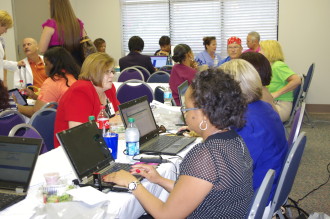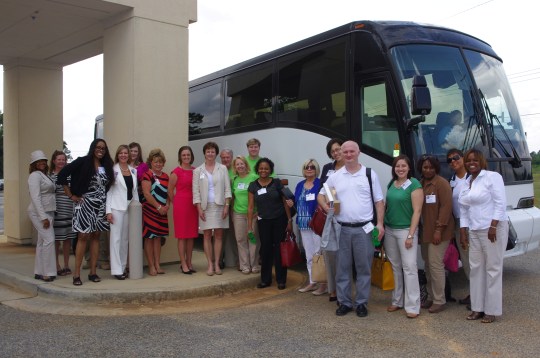“Meaningful use.”
It’s another confounding term in the often opaque lexicon of health care. But it represents a concept that is important for health care providers’ bottom lines.
The basic idea is that Medicare and Medicaid will pay incentives for hospitals and doctors to demonstrate “meaningful use” of electronic health records (EHRs) to improve patient care.
And to help rural doctors get up to speed with education and technical assistance on meaningful use, a two-day bus tour swept through central and eastern Georgia last week.
Experts on board the bus came from GA-HITEC at Morehouse School of Medicine in Atlanta; the state Department of Community Health; HP Medicaid; the Georgia Health Information Network; the Medical Association of Georgia; and HomeTown Health. They visited Thomaston, Hawkinsville, Eastman, Fitzgerald, Baxley, Springfield and Swainsboro to provide hands-on help to physicians and others.
“There have not been many resources out in rural areas,’’ Kathy Whitmire of HomeTown Health, an organization of rural hospitals in the state, told GHN. She said the experts consulted with physician practices representing more than 120 eligible doctors, physician assistants and nurse practitioners.
Dr. Tonya Fordham, a family medicine physician in Baxley, met with the experts visiting the Appling Hospital there.
“We’re always behind the eight ball trying to figure out what [the government] wants,’’ she told GHN in an interview.
Fordham, who’s in a solo physician practice, said she has had an electronic health record for the past seven years. “I’m further along than even the hospital is,” she said.
But while she has received two incentive payments through meaningful use, that has not covered her costs of implementing the changes needed, she said.
The 2009 federal stimulus provided $30 billion as an incentive for health care providers nationwide to implement electronic records for their Medicare and Medicaid patients.
Proponents say electronic health records can improve coordination of medical care, reduce errors and unnecessary duplication of tests, provide better research data, and engage patients and families in their care.
Failing to achieve meaningful use, though, can mean financial penalties for providers. Whitmire of HomeTown Health said the bus tour experts helped file more than 30 hardship exemptions for doctors who have not been able to implement an electronic health record so far, allowing them to avoid a penalty in 2015.
Whether it’s incentives, penalties or other factors, the EHR push has paid off.
Last May, HHS Secretary Kathleen Sebelius said more than half of all doctors and other eligible providers had received Medicare or Medicaid incentive payments for adopting or meaningfully using electronic health records. She said HHS had met and exceeded its goal for 50 percent of doctor offices and 80 percent of eligible hospitals to have EHRs by the end of 2013.
The government has laid out meaningful use objectives for providers in three stages, gradually increasing tasks, such as handing out a summary to patients after each visit.
But that doesn’t make it easy. Rich Carter, who manages physician practices at Dorminy Medical Center in Fitzgerald and Emanuel Medical Center in Swainsboro, said last week that attaining meaningful use is “a huge project for any doctor.”
Physicians “need someone to help them through the … process,’’ Carter told GHN. “The requirements become more and more challenging to achieve each year.’’
“Doctors have a lot [of issues] on their plate. It’s difficult to add one more.”
Stage 2 of meaningful use includes providing a Web portal for patients to get secure online access to their health information. But that doesn’t work for all patients, especially in areas where many residents are poor or didn’t grow up in the digital age.
“Seventy to 80 percent of my patients don’t have a computer,’’ Fordham noted.
Still, Fordham said she believes electronic medical records are a good idea. “I think it will cut down on errors,” she said.
Fordham added that if she can get better, quicker feedback from specialists who see her patients, “I think it will be great.”


